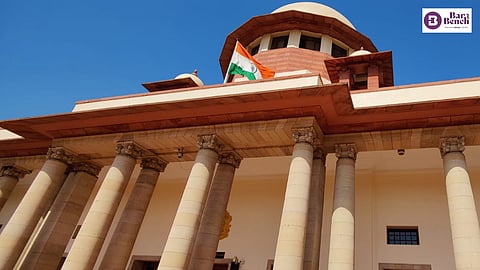
- News
- Columns
- Interviews
- Law Firms
- Apprentice Lawyer
- Legal Jobs
- हिंदी
- ಕನ್ನಡ

The Supreme Court of India on Friday observed that public interest litigation (PIL) petitions are being increasingly employed as an instrument of blackmail to target infrastructure projects, particularly in Delhi and Mumbai [Sarthi Seva Sangh & Anr v Mumbai Municipal Corporation and Ors].
A bench of Chief Justice of India (CJI) DY Chandrachud and Justice PS Narasimha observed that a when a particular property is targeted in a PIL, the High Court is often aware why the party has approached the court.
"PILs could become an instrument of blackmail when it is an issue of an infrastructure project. This actually makes a plank to target such projects. High Court has actually smelled the rat here. This is happening across in Delhi, Mumbai, etc," the Court remarked.
The Court, therefore, upheld a Bombay High Court order which had imposed costs of ₹1 lakh on a society for filing a PIL for extraneous, motivated reasons devoid of any public interest.
The petitioner, Sarthi Seva Sangh had moved the High Court challenging redevelopment of a plot at Worli.
After being told by the petitioner-society that one of their objects was promoting the ecology, the High Court had directed the petitioner to produce a copy of its Memorandum of Association.
From the memorandum, the High Court had found that promoting ecology was not the society's object and that one of the petitioners, an individual, had no connection to the petitioner-society. It had, therefore, determined that the petitioners had not approached the Court with clean hands and dismissed the PIL with ₹1 lakh costs.
This promoted the present appeal before the High Court.
The Supreme Court concurred with the High Court, stating that the idea of the PIL was to target project and the High Court had sensed the same.
"When a particular property is targeted in a PIL, the High Court is often aware why the party has approached the court. The idea is to target one project and High Court often knows why is it happening," the apex court remarked.
In such cases of redevelopment projects, another competitor is behind such petitions and they join with other builders, the bench observed.
"I have sat across many such cases before the Bombay court," CJI Chandrachud said.
The Court, therefore, upheld the order of the High Court.
"Cost imposed by the High Court has to be paid. It is a misuse of the judicial time. Cost has to follow the cause," the top court made it clear.
Senior Advocate Vibha Datta Makhija with advocates Rakesh Agarwal, Mrinmay Bhattmewara, Samprati Bhattmewara, Rajvir Singh Bhati, and Sanjay Kumar Tyagi represented the petitioners.
[Read order]